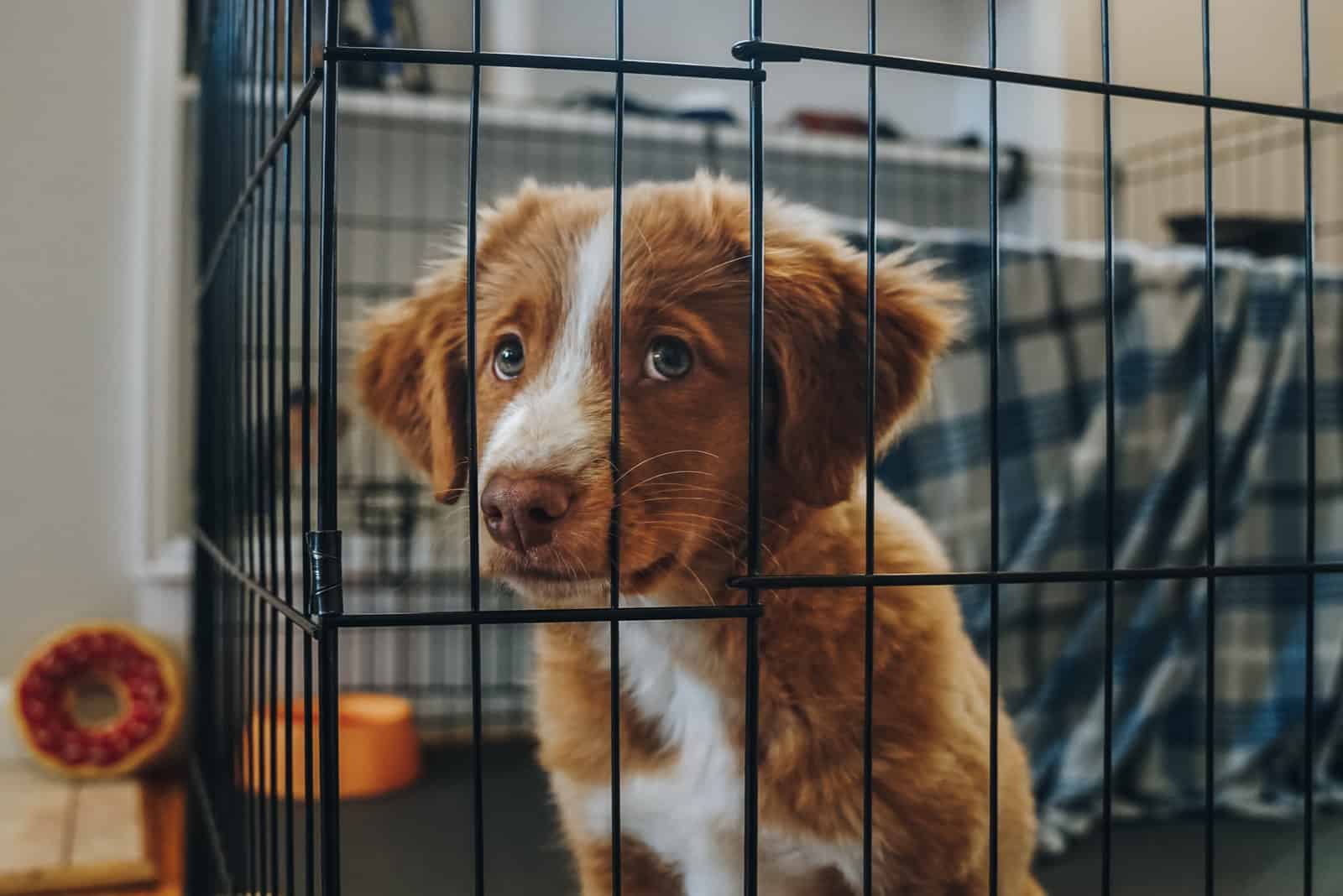Let’s picture this: you finally got your new puppy, you’re happy and excited. Everything seems so sweet and beautiful, but then, all of a sudden – your new little pooch starts crying at night – and now you’re stressed and don’t know what to do or how to help.
If you are in this exact situation, don’t worry, because we are here to help. In order to assess the situation, we need to look at this problem from two sides and ask ourselves some questions: Why is my puppy crying at night in the crate? And, how do I stop my puppy from crying?
Being a new puppy owner is not an easy thing, you have to learn how to take care of your new family member and he or she also needs to get used to their new environment. Puppies crying is a difficult and quite common problem among new owners, believe me.
If you are also dealing with this situation, and you desperately need some answers, keep reading, because we are going to discuss everything you need to know about your puppy crying at night in a crate and hopefully help you, so you don’t lose your mind.
Why Is My Puppy Crying At Night In A Crate? 9 Possible Reasons
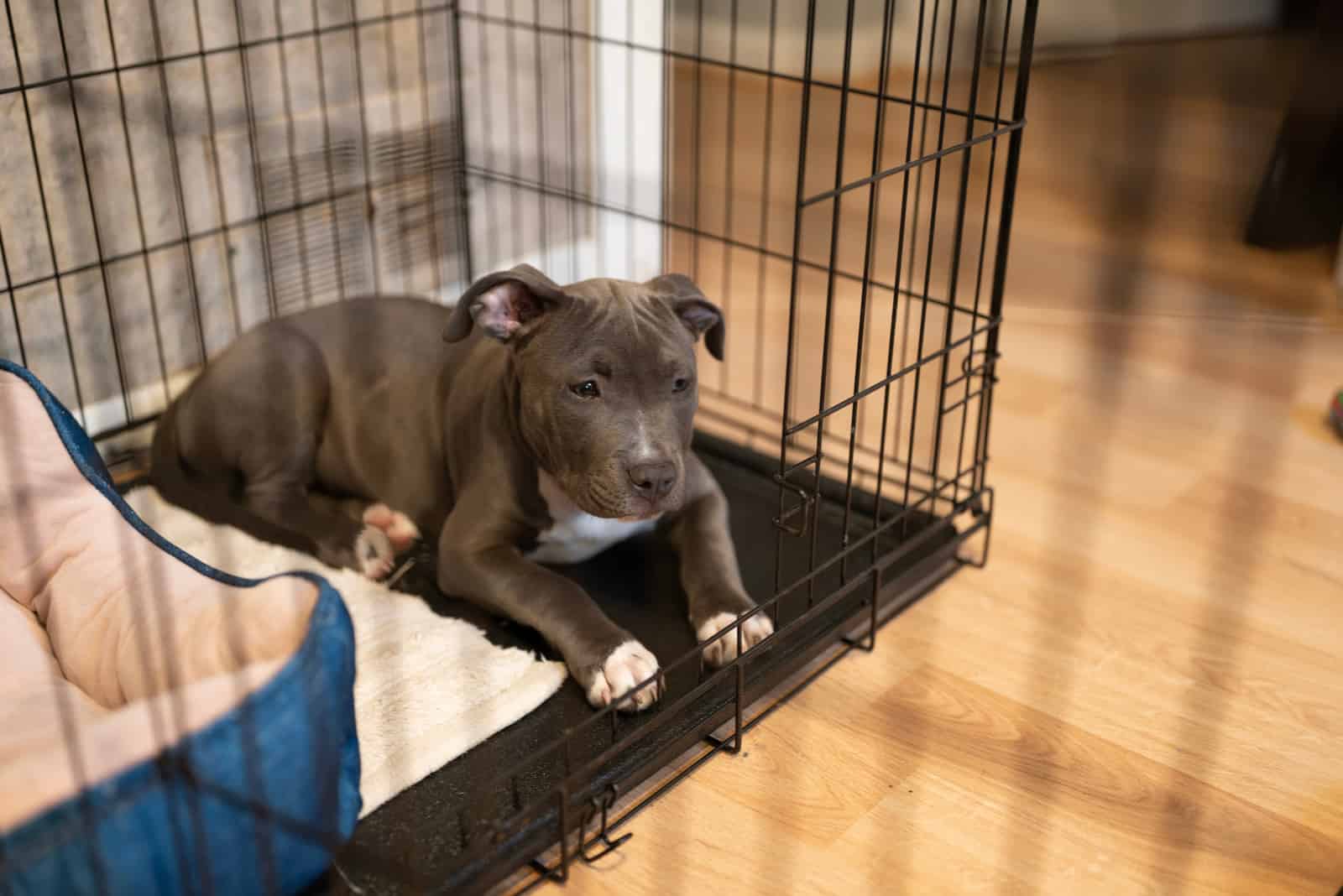
“Why do puppies cry?” is a really common question among dog owners? There are many reasons that can cause such behavior, and knowing and understanding those reasons can massively help you in preventing your puppy crying at night in a crate.
1. Stressed Doggy
One of the main reasons why is your puppy crying at night in a crate, is because he or she is stressed and feeling anxious.
If you think about it, puppies experience a lot of change in the first couple of weeks of their life, and of course, since they are still so small, these changes may cause a lot of stress.
While they can seem all right during the day when they are surrounded by you and your family members, in the middle of the night, the crate can seem such a scary place, especially during the first night.
Crying is quite common during their process of adjustment, and as soon as your puppy gets adjusted, he will no longer feel anxious and stressed.
2. Energetic Doggy
Some dogs have higher energy levels than others, but all puppies are usually little energetic balls of fur. This excess energy keeps them awake at night and whining to be let out.
So, the answer to, why is your puppy crying at night in the crate, might be because they are still too excited and need to burn their excess energy, and being closed in their crate does not allow them to do so.
3. Lonely Doggy
Being locked in a crate can sometimes feel like being in a prison cell, away from everyone. Your puppy might just be crying because he feels lonely and misses you, especially if you spend a lot of time with them during the day.
They get used to your presence and companionship, so at night they miss you so much that it makes them cry. Sad, isn’t it?
Your puppy’s whining may stop when they see you, but then start again when you go away.
4. Bored Doggy
One of the reasons may also be boredom. A crate is not exactly an exciting place to be to be honest, so it is not surprising that your puppy feels bored.
Dogs that love to be active and require a lot of mental stimulation will very likely feel bored having to sleep in their crate.
5. Scared Doggy
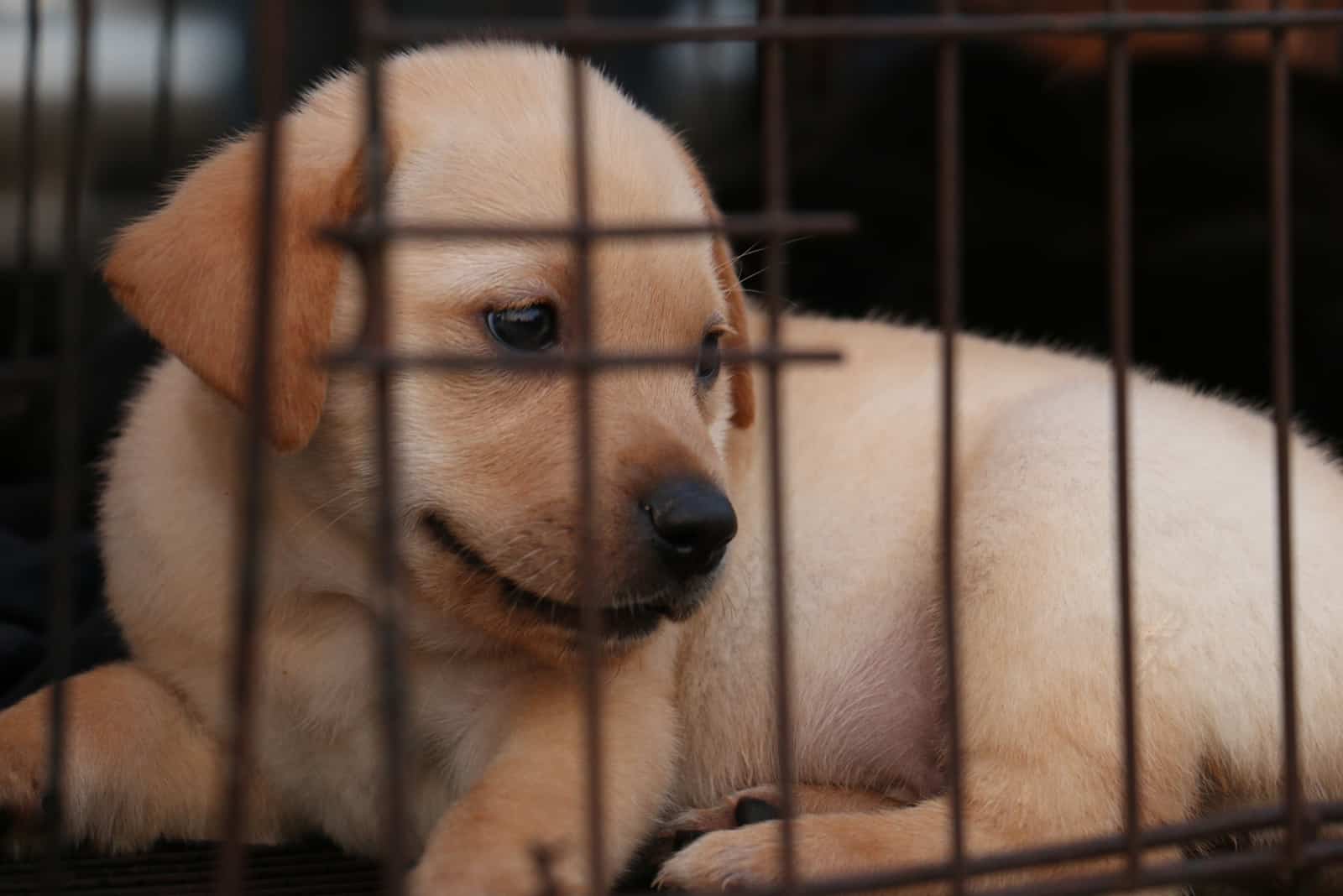
If your dog is constantly crying when you put him in the crate, then the reason might be because he is scared of it. If they are scared of the crate, then sleeping in it at night will be a big no-no for them.
This is usually more common in puppies whose owners punish them with crate time, which then makes them associate the crate with bad feelings. Yelling at your dog is never the answer, but will just make him feel more scared of you and the crate.
6. Hungry/Thirsty Doggy
Sometimes it can also be the case that your dog is hungry or thirsty and because of that, he is crying to get your attention. It is important to always check your dog and see if you can understand the reason behind their whining.
If you find his water and food bowl completely empty, this should be a give-away sign. Puppies especially, require more food and protein than adult dogs, which is why you should make sure that your puppy has enough food and water during the night too.
7. Needs-To-Go-Out Doggy
Sometimes a puppy needs to get out of the crate. It may be because of various reasons, but the most usual one is a potty break.
Young puppies don’t have the knowledge to hold it in, since they are potty-trained as they grow up. So, if your puppy is all of a sudden crying in the middle of the night, he might need a bathroom break.
Puppies don’t want to pee or poop in the same place that they sleep, and since they can’t get out of a puppy crate by themselves, they will cry for you to let them out.
You should be aware of this, especially with younger puppies, since they physically sometimes cannot endure a whole night closed in the crate.
8. Uncomfortable Doggy
An uncomfortable crate will also cause your puppy to cry. It is very important to choose the proper crate for your dog. If your puppy does not have an appropriate crate, this will significantly affect his crate training.
When choosing a crate, you need to make sure that your puppy has enough space to stand up, lie down comfortably, turn around, and that an appropriately sized bed can fit inside it.
A crate that is placed in the wrong spot in the house will also highly influence the level of comfort of your puppy.
9. Sick Doggy
A sick puppy will cry to show you that something is causing him pain. This will also happen during the day, but may intensify during the night.
Your puppy may be experiencing stomach problems, teething, or any other pain that requires medical help, or at least some medication to relieve the pain.
See Also: Dog Temperature Chart: Does My Dog Have A Fever?
How To Stop Your Puppy Crying At Night In The Crate?
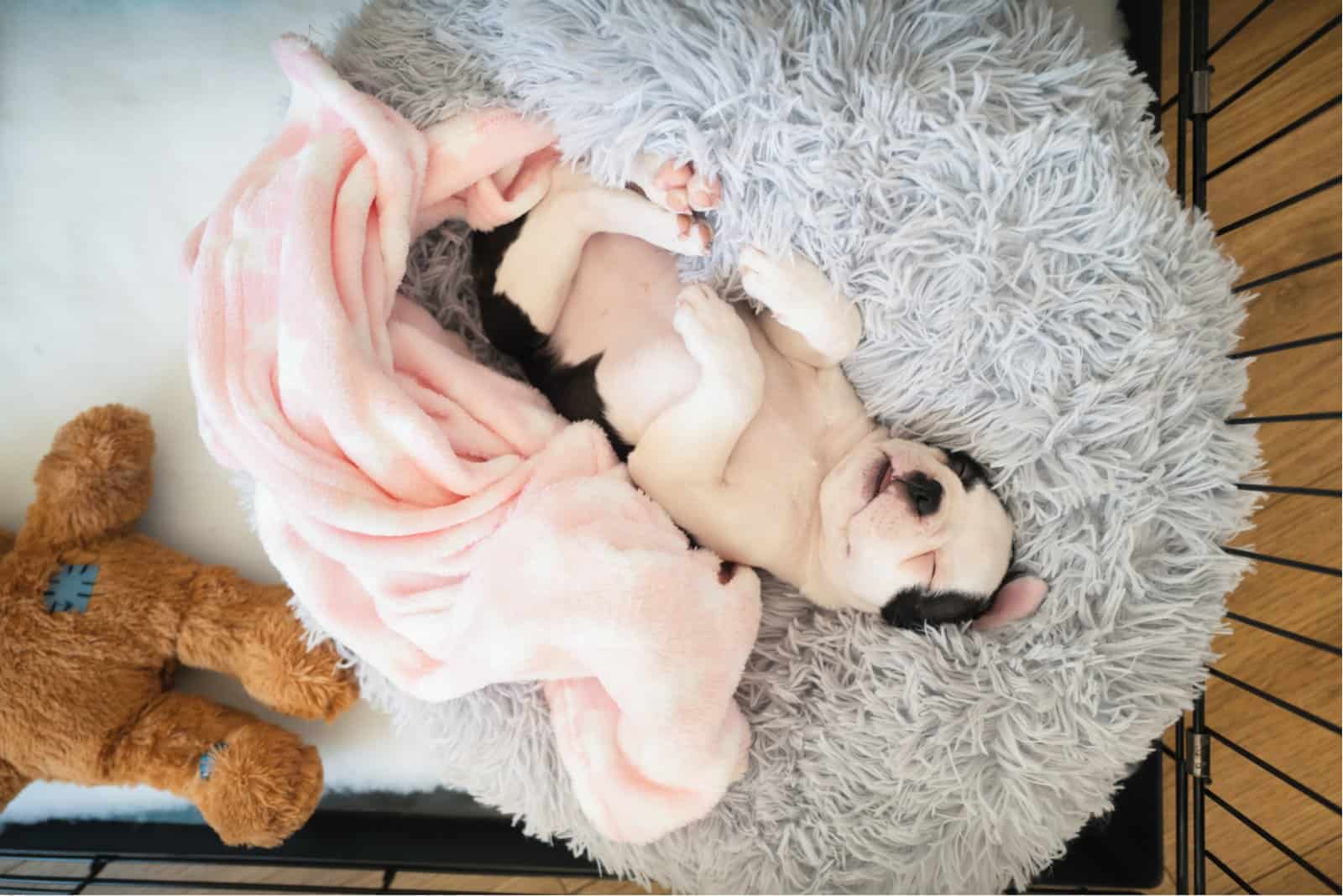
Crate = Awesome Place
In order for a puppy to be happy about his crate, develop a positive association with it, and to not cry at night, it is important to make the crate as perfect as possible. An environment that your dog will not be afraid of, but rather a place where he can’t wait to go to.
There are some things that can help you with this, for example:
Treats
Treats are a great way to help your dog enjoy his crate a little bit more. You can use the kibble that you are already feeding him with, or some of the treats that your puppy loves.
Just leave them inside the crate every time you put your puppy in, and this will help your pup to forget a bit about the crate because he will be focused on the treats. Over time, your dog should get accustomed to the crate, and you can stop giving him treats gradually.
Toys
Dogs love their toys, and of course using them is one way to help your dog fall in love with their crate. You can use their favorite chew toy or favorite teddy bear and place it in the crate every time you need to put your puppy in there.
It will give them something to play with and entertain them, so they are not bored inside.
Your Doggy Needs Exercise
Most dogs will have a really hard time in their crate if they are still full of energy and ready to run and play. This is why it is extremely important to tire your puppy out in order to avoid your puppy crying at night in the crate.
Depending on their age, whether you have a young or old puppy, and their breed, you will need to provide the correct amount of exercise that he or she needs.
For younger puppies, this can mean just a couple of minutes of playtime and running around, but for older and bigger puppies, such as a Labrador or a Retriever, this will mean at least half an hour of exercise.
Your Doggy Needs Comfort
Try to make the crate as comfortable as possible. Find a crate that best suits your dog, where he will have enough space for his own bed, and one that will be big enough, so he can stand, lie, and comfortably turn around in it.
Put his comfort stuff inside it and this will calm him and make the crate a comfortable place that he wants to stay in, without any problems.
Your Doggy Needs Routine
Dogs love routine a lot, and they thrive on it. If you want your puppy to behave well, then you should make a routine that he can follow every day.
If you teach your dog that first he gets food, then playtime, and then he should go to sleep in the crate, then over time, he will do it by himself because he is used to it.
No Distractions!
When leaving a dog inside a crate for the night, it is important to try to limit any distractions that could make him agitated during the night. If your puppy is constantly seeing something exciting outside the crate, he will probably start to cry to be let out.
A good tip is to place something over the crate during the night to create a comfortable little space that will not have full visibility of the house and therefore, your pup will not have any distractions.
Placement Of The Crate
Sometimes the reason behind your puppy crying at night in the crate, is the placement of the crate. If you notice that your puppy is constantly crying when you are not with him, maybe you should try to put the crate in your bedroom instead of the living room.
It will provide your pup with a sense of comfort and your closeness will calm him, so both of you will be able to get a good night’s sleep.
Potty Train Your Doggy
It is necessary to potty-train your puppy as soon as possible. I am sure that you don’t want accidents happening in your house, therefore, train your dog that crying only means that he needs to go out for a bathroom break.
This way, you will know exactly what your puppy wants, and your puppy will also know that he should only cry when he needs to go potty. He will not be ignored for hours, and you will probably get a good night’s sleep.
The good thing is that as they get older, they learn to control their bladder better, which means less potty breaks during the night.
Crate Train Your Doggy
Crate training is essential for all puppies. If you thought that you can just buy a crate and your dog will know when and how to use it, well, you made a big mistake. Some dog training, and especially house training, is essential for having a well-behaved puppy.
You need to do this by creating a positive association with the crate. You may ask yourself – how do I do that?
• First, you will need to introduce your dog to the crate
• Then, you can start by feeding your puppy inside the crate, just make sure that the crate door is open while doing this, so you don’t create stress and anxiety from a closed space right in the beginning
• Condition him to spend a longer period of time inside the crate. Give him a command for this behavior such as kennel up, or something similar, and reward him with a little treat every time he goes inside.
• You should first start with crating your dog for a shorter period of time when he is left alone, so he gets accustomed to the situation, and after time, you can crate him at night too.
A responsible breeder will have started playpen and crate training before you even got your puppy, but if not, and if you are not sure how to do it properly, you can always hire a dog trainer to help you.
Avoid Crate Training Mistakes
When you’re training your puppy to use a crate, you should be careful of the following common mistakes:
• Being inconsistent – One of the worst things you can do is to not be strict and consistent with your training and commands. This will eventually confuse your dog and you will not be able to properly train him. It will make it hard to not only crate train him, but to train him in general!
• Leaving your puppy for a long period of time – You need to be aware that not all dogs can endure the same conditions.
Some puppies will not be able to endure the whole night without a potty break, so make sure that you know your puppy’s schedule and that you don’t leave him crated for too long, at least in the beginning, as they get older they can last longer.
Ignore The Behavior
It can be really difficult sometimes – especially when you hear your puppy crying for the first time – but if you are sure that there are no big problems with your puppy, then it is best to try to ignore this behavior.
If you go to him every time he cries, and you cuddle and comfort him, then he will get used to this kind of attention, and he will be crying to get it every time.
They will start to associate crying with something good, like love and attention, and therefore it will be a tool for them to use when they want to get something from you.
Dogs are quite similar to children in some ways. If your child cries in the shop because he or she wants you to buy them something, and you give up, they will immediately learn that crying gets them stuff.
FAQ
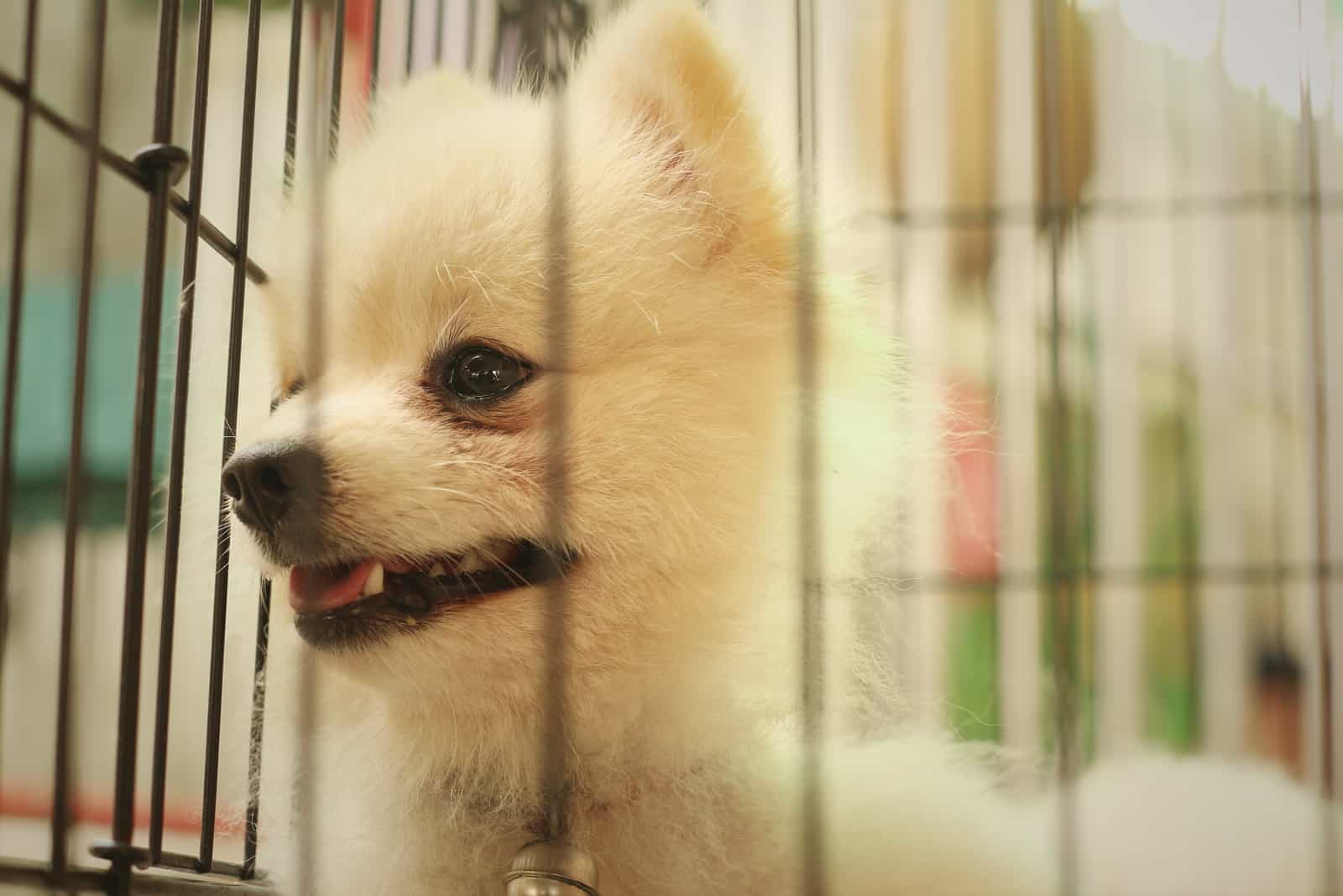
How Long Does It Take For A Puppy To Stop Crying At Night In Their Crate?
For some puppies, it takes just a couple of days for them to stop crying, but in some cases, this can last for a couple of weeks or even months.
Your puppy will stop crying at night when he or she gets used to the crate and a completely new environment, including a new home and new people.
It is important to remember that you should never scold or punish your puppy for this kind of behavior. Puppies cry because they are scared or stressed, and scolding them can just increase their anxiety, which will then make it harder to get your little pooch used to you and your family.
Eventually, when a puppy gets used to his surroundings and feels completely safe, secure, and comfortable, he or she will stop crying. You just have to be patient and survive a couple of sleepless nights.
Try to make your dog’s crate a comfortable place where he will feel safe, happy, and will willingly go to sleep. This will significantly help with the transition and help make the process easier and faster.
With all that being said, it is impossible to say exactly how long it will take your puppy to stop crying, since every puppy is different and may deal with situations differently.
How Do You Soothe A Crying Puppy In Their Crate?
Puppies are like small babies, and what they need most is someone to care for them and be with them, especially after being separated from their mothers and littermates.
The best way to soothe your puppy crying at night in their crate, is to be there for him and comfort him with petting, a lot of cuddles, and sweet-talking.
We always want the best for our little pets, and when we see them in distress and crying, we do anything to help them. This is not just because we can’t sleep because of their whining, but because we care so much about them and hate to see them in this kind of distress.
Your presence and familiar smell will calm your crying puppy and help him with his separation anxiety and stress.
Just be careful with this, because they may get used to it and start crying every time they want a bit of attention. So, it is on you to assess the situation and decide if they really need to be comforted or not.
Should I Let My Puppy Cry At Night In His Crate?
The best answer to this question is yes and no, because it all depends on the situation. If your puppy is crying because of sickness, then you shouldn’t let him cry, but help him as soon as possible.
However, if your puppy is crying because he just wants attention, then ignore it, and he will soon get used to the crate and stop whining and crying.
Should I Let My Puppy Sleep In The Same Room As Me?
For the first couple of weeks, it is advisable to let your puppy sleep in the same room as you, either in a dog bed or crate. This will provide them with a sense of comfort and safety, and help them with the transition to their new home.
Summary
Having a puppy might be as difficult as having a baby. For the first couple of days it can seem such a difficult task, especially when you have a puppy crying at night in the crate and not even ear plugs can help you with the loud whining.
In order to stop the crying, it is necessary to understand the reasons why your puppy might be crying and then act accordingly. Your new puppy may need some time to get accustomed to their new environment and may be suffering from separation anxiety.
Remember that the first couple of nights are the hardest and that it should get better after some time. It is a learning curve for you and also for your puppy, but don’t let these little problems stand between you and your furry best friend.
Read Next: Why Does My Dog Cry When Carrying Toys? – 12 Reasons and Solutions
